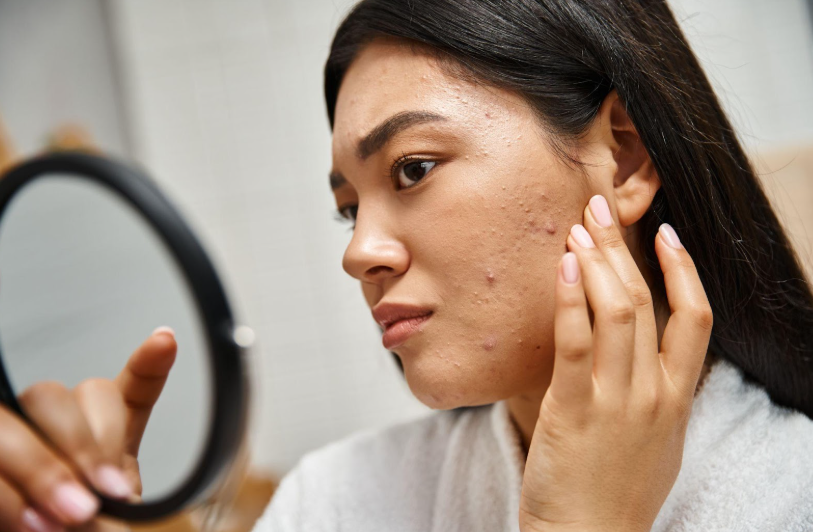Cosmetics are used to color and adorn the body in a stylish fashion while cosmeceuticals are non-prescription products which are intended to improve your skins appearance from a functional standpoint. These product categories are not regulated, thus the actual skin care benefits must be separated from the marketing hype. A topical over-the-counter product cannot deliver the results obtained from a prescription product or a cosmetic procedure purchased at a dermatologist.
Category: Skin care product
Purpose: Maintain healthy skin
Examples: Cleanser, soap, moisturizer, astringent, antiperspirant, bubble bath and body wash
Category: Cosmetic
Purpose: Beautify, and adorn the skin, hair, or nails
Examples: Foundation, mascara, lipstick, nail polish and hair dye
Category: Cosmeceutical
Purpose: Improves the skin’s appearance by providing ingredients necessary for healthy skin.
Examples: Non-prescription anti-aging products (and any other product applied to the skin that contains one or more ingredient said to improve the skin’s function)
COLORED FACIAL COSMETICS
It is important to select make-up carefully since it remains in contact with the skin for a long time. Ideally, make-up should be hypoallergenic, non-comedogenic, -
Meaning it produces fewer allergies and will not plug pores or cause acne> Look for cosmetics with sunscreen, which will help prevent skin cancer and wrinkles.
SKIN CARE PRODUCTS
Of these, cleansers and moisturizers are the most important in preventing dry skin, a common dermatologic condition. The dryness cause cracks, and fine wrinkles in the skin, which decreases its effectiveness as a barrier, and can cause pain and itching.
Soaps, detergents, bath or shower gels, and bubble baths remove dirt, body oils, and bacteria for the skins surface. They prevent odor and infection, but heavy use of the products or certain specific brands can over dry the skin causing flaking, itching, and irritation and this may lead to the development of a dermatitis. People with dry skin should choose a mild cleanser, bathe or shower with cool water, minimize water contact, and apply a moisturizer, immediately after bathing while the skin is slightly wet.
There are several different varieties of soaps. Deodorant soaps that contain an antibacterial agent to eliminate odors may be much more drying to your skin. The use of a non -fragranced beauty-bar soap are generally less drying and irritating.
Moisturizers prevent water loss by layering an oily substance over the skin to keep water in, or by attracting water to the outer skin layer from inner skin layer. Substances that prevent water loss include petrolatum, mineral oil, lanolin, and dimethicone. Substances that attract water to the skin include glycerin, propylene glycol, proteins, urea, and some vitamins. Moisturizers can prevent dry skin and minimize the appearance of wrinkles related to dry skin.
CATEGORIES OF COSMECUTICALS
Cosmeceuticals are products that may improve the functioning of the skin and be helpful in preventing premature aging, Let discuss some examples.
HYDROXY ACIDS
Hydroxy acids are ingredients designed to remove the outer dead skin cells through a process known as exfoliation. The removal occurs through a disruption of the bonds between the cells which occur naturally in youth, but slow down with advancing age. Too many retained dead cells leave the skin rough, dry and sallow appearing.
Commonly used hydroxyl acids include glycolic acid and salicylic acid. Some people refer to these acids as “fruit acids”. These classes of hydroxyl acids increase skin exfoliation, making aging skin appear smoother and softer. Hydroxy acids can be added to daily use moisturizers or incorporated into topical solutions used in dermatologists’ offices, such as chemical peels.
It is important to understand that hydroxyl acids act mostly on the most outer layer of your skin known as the epidermis which is like the “roof on your house”.
RETINOIDS
Retinoids are a family of vitamin A chemicals found in foods and also chemically synthesized in a laboratory. Vitamin A is important to both skin and eye health and should be consumed on a daily basis. Fruits and vegetables that are yellow, orange or red in color are rich sources of vitamin A since these colors are created by the presence of vitamin A. Examples include citrus fruits, carrots, tomatoes, pumpkin and yellow squash.
Topical formulations of Vitamin A can be applied directly to the skin, causing skin cells to grow and die more rapidly, thereby increasing the turnover of cells. This is best accomplished by a synthetic form of Vitamin A, known as tretinoin which is only available by prescription in the United States. You may know this topical preparation as Retin-A Cream.
There are less potent cosmeceutical forms of Vitamin A that are available over the counted include retinol, retinaldehyde, retinyl palmitate, and retinyl propionate.
Both the prescription and over –the-counter Vitamin A may cause skin irritation, dryness, and peeling, so it is important to carefully follow the directions for use supplied with these products.
It is my belief that the prescription products are much more effective in the treatment of anti-aging. The retinoids primary action is on the deep layer of your skin know as the dermis. Think of the dermis as “the foundation of your house”. If you fix the roof and do nothing to the foundation the house will lose strength and then collapse hence you develop a wrinkle.
BOTANICALS
Some of the most interesting cosmeceuticals come from plants and are called botanicals. Roots, fruits, seeds, beans, leaves, and twigs are used to make botanicals.
What is important to understand is that many botanical extracts used in cosmeceutical preparations contain antioxidants, which are substances that prevent energetic oxygen molecules created by ultraviolet (UV) radiation from damaging living things on earth. Antioxidants help protect plants and humans.
The main antioxidants used for protection by the human body are vitamins C and E.
These vitamins must be orally consumed daily for optimum health, which is why eating fresh fruits and vegetables is so important for healthy skin. Some believe that antioxidants also might be helpful if applied to the surface of the skin. Antioxidants added to cosmeceuticals include green tea, pomegranate juice, chamomile flowers, coffee berry, and licorice root extract. These botanical antioxidants are typically placed in moisturizers, and sometimes in combination with a sunscreen.
SUNSCREENS
Dermatologists recognize that one of the most potent cosmeceuticals on the market today to prevent and reverse the signs of aging is a sunscreen.
Sunscreens help prevent photo-aging and photo-carcinogenesis (cancer caused from the sun).
Sunscreens should be one of the cornerstones of any skin care regimen.
In my practice when I consult with a patient in regards to a specific photo-aging skin care program it must be individualized for each patient. It is unfortunate that many patients attempt to self-treat themselves with a number of over-the-counter cosmeceuticals and have purchased a number of duplicate products and waste a lot of money on expensive products that they do not need and therefore they get marginal or unsatisfactory results.
I tell my patients that the most cost effective way to begin a photo-aging program is to have it coordinated and prescribed by your dermatologist




